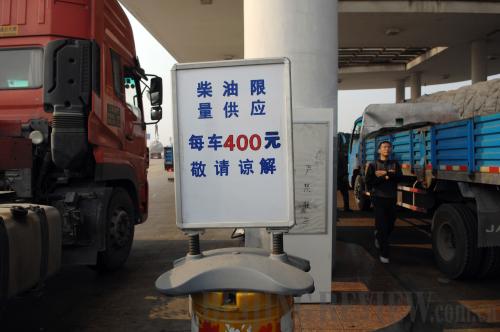|
 |
|
LIMITED PURCHASE: At a gas station in Zhejiang Province, each car can buy 400 yuan ($60.24) worth of diesel oil at a time. Many gas stations are limiting the amount of diesel oil customers can purchase (JU HUANZONG) |
Li An has made many journeys from Xinzhou, Shanxi Province, to Beijing on the expressway. The trips have been too numerous, much like his cargo of potatoes that will be sold at the Xinfadi Farm Produce Wholesale Market in the Chinese capital city. Recently, Li has run into problems that could threaten his trucking excursions to Beijing and across China.
Since October, diesel oil shortages that started in south China have spread north and west, with many gas stations low on or completely lacking diesel oil. To fill his tank, Li often has had to visit five or six gas stations. "Without a full tank, we dare not run the truck," he said.
According to figures released by the Petroleum Circulation Committee (PCC) of the China General Chamber of Commerce, by November 12 this year, more than 5,000 privately owned gas stations had run out of diesel fuel and 80 percent of state-owned gas stations had limited the amount of fuel customers could buy.
This isn't the first major diesel oil shortage to plague China. In the past decade, such shortages have happened every one or two years. But this shortage sets itself apart from previous ones, and while it may not impose a serious impact on the Chinese economy, it has sounded the alarm from the country's energy mechanism.
Behind the shortage
This year, the blame for the lack of diesel falls on some local government measures to limit electricity use in parts of China.
Five years ago, the Chinese Government set a target that by 2010 the energy consumption per unit of GDP would be reduced by 20 percent of 2005 levels. The decision was passed down to all provincial-level governments under the stipulation that government officials in these areas would be held responsible if the targets were not reached.
As the deadline quickly approaches, local officials are scrambling to save energy and reduce emissions, and one of the ways they're doing so is to limit electricity supplies.
Zhong Yongsheng, Deputy Director of the Center for China's Urban-Rural Development Studies, said because of the rush limit of electricity, many enterprises have had to generate electricity by themselves using diesel oil. And so the shortage began.
Furthering the dilemma was the fact that many oil refineries often perform maintenance work on equipment in July and August when oil consumption is usually low. This year, however, output decreased just as demand was increasing.
"The reduction of diesel oil output and limits on electricity supplies jointly caused the shortage of diesel oil, directly and indirectly," Zhong said.
Liu Feng, a petroleum industry analyst with Shandong Zhuochuang Information Co. Ltd., said this year the diesel oil shortages mainly hit south China, especially the southeast coastal area, which was directly related to the limit of electricity supply by some local governments. The unexpected limit has increased the country's demand for diesel oil by at least 100,000 tons.
Zhao Youshan, PCC Chairman, thinks some branches of China National Petroleum Corp. (CNPC) and China Petroleum and Chemical Corp. (Sinopec) have jointly directed the diesel oil shortage this time. The two state-owned oil giants, as the country's biggest refined oil suppliers, have monopolized the Chinese oil market.
During negotiations with the branches of the two oil giants, Zhao became familiar with their policies and practices. He said he eventually found out these branches had oil in their depots, but had stopped oil wholesale to other gas stations and were only supplying their own gas stations.
"Before each oil shortage, these branches will create tension in the market by stopping wholesale and limiting supplies. Then the price of oil increases. Jointly pushing up prices has been a basic sales strategy for them," Zhao said, adding that their ultimate goal is obviously to force the National Development and Reform Commission (NDRC), who has pricing power over refined oil, to raise the selling price of refined oil.
According to figures from the National Statistics Bureau and the General Administration of Customs, in June 2010, China produced 13.34 million tons of diesel oil. It imported 83,000 tons and exported 269,000 tons, so the apparent consumption—the sum of net input and output—in June was 13.15 million tons. Domestic apparent diesel oil consumption was 13 million tons in July, and then declined further to 12.89 million tons in September.
Traditionally, diesel oil demand is low in June and July, hence exports of diesel oil often increase rapidly. But because domestic demand was low in June and July this year, the high apparent consumption of diesel shows that the diesel inventory was actually increasing, or at least higher than usual, during those two months.
So why haven't China's oil giants been selling their oil? Because on the refinery oil market, the retail price has been lower than the wholesale price.
In early November, the wholesale price of diesel oil in China was 7,634 yuan ($1,149.7) per ton, increasing 818 yuan ($123.19) per ton month on month, which was 154 yuan ($23.19) higher than the average national retail price per ton.
Zhong Jian, chief analyst of the Shanghai Toprise Information and Technology Co. Ltd., said higher wholesale prices than retail prices would cause wholesalers to find it difficult to sell expensive oil and make retailers unwilling to sell oil at a loss.
| 